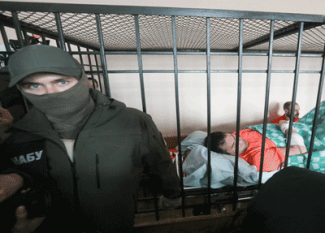Nasirov arrested: a blow against corruption in Ukraine

On 2 March, shortly before midnight, officers from the National Anti-Corruption Bureau of Ukraine (NABU) and the Special Anti-Corruption Prosecutor's Office (SAP), charged Roman Nasirov, the head of the State Fiscal Service, with abuse of powers (under Article 354 of the Penal Code). On the night of 6 to 7 March, a court defined the preventative measure in terms of 60 days’ detention or a fine of 100 million hryvnia (about US$4 million). Nasirov was accused of the unlawful restructuring of tax arrears from businesses belonging to Oleksandr Onyshchenko, a former parliamentarian, who himself has been accused of corrupt practices in gas trading, and is in hiding abroad. The state is estimated to have lost around 2 billion hryvnia (about US$80 million) as a result. On 3 March, the government suspended Nasirov from his duties for the duration of the investigation, but the Attorney General Yuri Lutsenko (appointed by the President) criticised the actions of NABU, accusing the investigators of violating procedures (the arrest should have been made between 6.00am and 10.00pm, but Ukrainian law does take derogations from that principle into account). President Petro Poroshenko only commented on Nasirov’s arrest on the afternoon of 6 March; he said that it was proof of the independence of the bodies tackling corruption in Ukraine.
Commentary
- The charges brought against Nasirov are the first by NABU against such a senior official. In turn, the court’s setting of a preventive measure in the form of temporary detention for the longest possible term (or a relatively high fine) only came about thanks to the pressure of activists, journalists and some parliamentarians, who for four days had supported the prosecution and picketed the courthouse. For several months public demand for the punishment of corrupt officials and politicians has been growing in Ukraine. Increasingly, corruption scandals and the behind-the-scenes agreements between government and oligarchs have been coming to light, and the courts are taking decisions favourable to members of former President Viktor Yanukovych’s team. The Nasirov case will test the government’s will for an effective fight against corruption, and an honest testimony on his part might trigger a political storm in Ukraine.
- In the Ukrainian political system, the position of head of the State Fiscal Service (DFS), which has broad powers over the tax and customs services, is of essential importance with regard to the covert management of financial flows. In Ukraine Roman Nasirov is seen as someone close to the business circle around the President. Before Nasirov became head of the DFS May 2015, he had been a member of the Poroshenko Bloc and chairman of the parliamentary taxation and customs committee. Nasirov’s actions as head of the DSF had been repeatedly criticised and his integrity called into question (for example, his failure to declare two flats in London as part of his assets). The service under Nasirov was accused of harassing entrepreneurs (spot checks at company premises, attempts at extortion), and of conducting non-transparent policies in the field of VAT refunds (special preferences for certain companies).
- It is possible that Nasirov’s arrest represents a kind of counterattack by NABU, and may also be part of a wider game for the future of independent anti-corruption institutions in Ukraine. NABU was created in April 2015 – under pressure from pro-reform politicians and civil society, and above all, as a result of US support – as an independent institution to fight corruption. The head of NABU has obtained a strong position, because his dismissal can only take place as a result of an audit by three auditors selected by the President, government and parliament. However, against the background of reports of corruption scandals, there are more and more indications that the government wishes to subjugate NABU and limit the effectiveness of the fight against corruption. Nevertheless, in February supporters of reform in parliament managed to block the selection of an auditor with a suspicious past, who was supposed to have replaced a lawyer recommended by the US government; the Ukrainian authorities are refusing to appoint a special Anti-Corruption Court, which could more effectively and quickly issue judgments in cases brought by NABU and the SAP. Since these institutions were created, they have come into increasing conflict with the General Public Prosecutor's Office and the Security Service of Ukraine. This is due to concerns that NABU will become the dominant law enforcement authority, which will monitor entities of the state administration. Currently, many investigations by NABU are not completed because of the slowness and lack of independence of the Prosecutor and the courts.
Tadeusz Iwański




